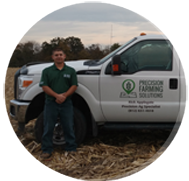One of the best things you can do to improve the utilization of fertilizers in your fields is to take regular soil samples. Whether you take the samples yourself, or you utilize a soil sampling service, the results from taking these samples can tell you if and how much fertilizer you need to raise a successful crop.
Soil sample testing is not new. The process of soil sampling has been around for quite a while. The way in which we pull the samples is changing though. Early on, we would take several small samples from different areas of the field and combine them into one composite sample. This one composite sample would represent either the whole field or large sections of that field. With the rising use of the yield monitor and GPS spatial mapping, we started to realize, and quantify, the amount of variability within a field. The next progression was to pull soil samples in 10, 5, and now more commonly 2.5 acre grids. This progression was partially driven by the desire to quantify the variability within each field, but also driven by the economics of pulling and paying for the soil sample testing, and getting a return on those costs.
Soil samples are most commonly pulled using a soil probe. This probe consists of basically a tube pressed into the ground, which fills with soil. Although this has worked well for many years, there are still issues to consider. There is very little depth control when using a soil probe. If the soil is extremely hard and dry, it is hard to get it in the ground 7 inches, which is the standard sampling depth. Operators may not get the probe deep enough in these conditions. Likewise, in really soft soil conditions, the operator may inadvertently push the probe too deep. These differences in sampling depth can really throw off the soil sample test results, especially in no till situations. The other biggest issue to using a soil probe is the lack of efficiency. No matter if using a soil probe by hand, or if it is on an automated system, you have to stop to pull each sample, which greatly reduces the amount of samples you can pull in one day.
We have recently partnered with another agronomy company to start offering a soil sampling service on ½ acre grids. With this intense sampling density, we can accurately map the variability across a field, at an economical price. The key to doing this economically is because we are using an automated sampling machine that never has to stop to pull samples and does not require any human handling of the samples. Give us a call, or visit our HD Soil Sampling webpage for more info.

Support is king. Getting started with precision ag equipment can be a daunting task. Downtime is not only frustrating, it can also be very costly. That's why we provide 24 hour/7 day service for our customers.
" We are Experts in Precision Ag "

Hello, I’m Rick Applegate, CEO of Precision Farming Solutions LLC of Huntingburg, Indiana, one of the state’s top leaders in the field of Precision Ag. If you farm anywhere in southwest Indiana or north central Kentucky, we are your local Precision Ag experts, dedicated to giving you the highest levels of product and personal support to keep you running at peak efficiency.
We provide the very latest in aftermarket Precision Ag products and services to help you become progressively more profitable. Our offerings include soil sampling services, field tile design, tile planning, variable rate planting and fertility recommendations, drones for ag, agcam cameras, auto steer systems, yield monitors, planter controls, tile plows, and comprehensive Data Management. We are passionate about both technology and agriculture and are deeply committed to showing forward-looking farmers exciting new ways of doing things.
We are known for our service and support. Everyone understands that if they purchase anything from Precision Farming Solutions LLC, we will be there to support them, literally day or night, seven days a week, making sure that at all times and in all situations they are completely covered.
That kind of support has led to intense customer loyalty, which has kept us steadily growing and expanding over the ten plus years that we have been in business. For more information, please call me at: (812) 684-9700.
Precision Ag, of course, is a rather broad term that encompasses many different products and activities, but in essence it boils down to one thing: it is a means of precisely measuring and reacting to spatial variations in plants and the soil. In the past crops were managed at the field level; fertilizers, seed, and chemicals were all applied at the same rate all across the field.*
(This is why it has often been said that “Precision Ag” could also be called “Site-Specific Ag”).
In today’s world however, thanks to satellite-based GPS, different areas of any given field can be managed in different ways, sometimes down to the foot or even inch by inch.
Using the techniques and practices of Precision Ag, you can take a very large field and manage it as if it were a group of very small fields. When you manage fields like that, both you and your soils work better, not harder. That is why Precision Ag is so good for your bottom line. And also so good for the environment.